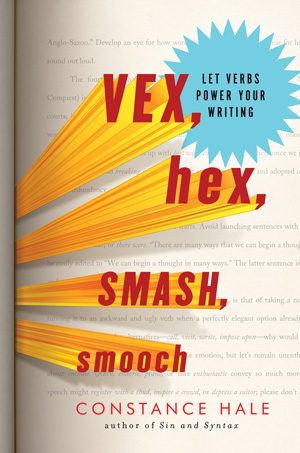B.J. Epstein reviews Vex, Hex, Smash, Smooch by Constance Hale, a book guaranteed to challenge any boring assumptions you had about English grammar books from your school days.
Gosh.
A book-reviewer.
Alas, no.
The proceeding sentences are all missing something, and for that reason, they’re not terribly informative or interesting. So what is it that is absent?
Yes, that’s right.
The verb.
Now you might be yawning at this stage, filled with half-forgotten and not very pleasant memories of English class and bewildering discussions about parts of speech. But hold on a moment. As Constance Hale points out in her enjoyable new book, Vex, Hex, Smash, Smooch, verbs are the ‘pivot point of every sentence’. They ‘put action in scenes, show eccentricity in characters, and convey drama in plots. They give poetry its urgency. They make quotes memorable and ads convincing.’
The way each chapter in Hale’s book works is that she takes on a topic (voice or tense, for example), explains what is challenging about it (this is the ‘vex’ of the title), demolishes a common belief about verbs (‘hex’), encourages readers to get rid of a bad habit (‘smash’), and educates readers about new things to try (‘smooch’). She offers activities (‘Try, Do, Write, Play’) and uses quotations from both literary and popular writing to exemplify her ideas.
For example, in one vex, she explicates verbals, which ‘don’t change with time…don’t express voice…have no moods. They are bona fide verbs: they can be modified by adverbs and they can take objects and complements. But in sentences they don’t act like verbs.’ To demonstrate participles, she quotes Dickens’ depiction of Scrooge as a ‘squeezing, wrenching, grasping, scraping, clutching, covetous old sinner!’
In a hex, she tells us to ‘reject the rule “Always use Standard English”’, and she speaks up for the use of dialect, as in Sojourner Truth’s speech ‘Ain’t I a Woman’. In another, she dismisses the idea that we shouldn’t use double negatives. In other words, don’t don’t. Got it?

by Constance Hale
One smash she offers suggests that long words can be too ‘pompous, highfalutin, and abstract’ and she recommends avoiding ‘bequeath, commence, conjoin, interrogate, and remunerate’. I personally don’t agree, because I think there are texts and situations where such words are needed – they presumably wouldn’t exist if they weren’t useful – but I do take her point that people sometimes try to write or speak in an unnecessarily complex way. In another smash, she discusses the challenges inherent in phrasal verbs, such as differ from and differ with.
Hale recommends the imperative – in other words, order such as ‘Just do it!’ – in one smooch, and nuance in another, by which she means in part understanding the difference between commonly interchanged words, such as careen, career and carom.
The book comes with a number of appendices, such as recommendations for dictionaries, a list of irregular verbs (did you remember that the past tense of abide is abode, and did you know that tread becomes trod, which then becomes have trodden?), information on challenging words (what’s the difference between raise, raze, and rear, and when do you use behove?), and an analysis of the history of language. I would have appreciated an index, though.
This is definitely not the grammar book you might remember from your school days. Vex, Hex, Smash, Smooch is easy to dip into at will, and it offers useful information, activities, and suggestions that will help any writer. Hale is an opinionated and witty guide to the weird and wonderful world of verbs.
Just buy it! Or don’t don’t.











